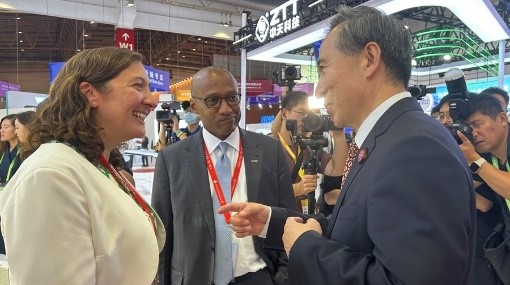Mohamed Kande, global chairman of PwC, said China International Supply Chain Expo is a significant event as the firm makes its debut as an exhibitor this year.
According to Kande, the global professional services provider is showcasing its complete service ecosystem covering entire industrial and supply chains at this year's expo.

Ren Hongbin (right), chairman of the China Council for the Promotion of International Trade, meets with Mohamed Kande (center), global chairman of PwC, and Hemione Hudson, chair and CEO of PwC China, at the PwC booth of the 3rd CISCE in Beijing on July 16, 2025. [Photo/China.org.cn]
"I am honored to be in Beijing for this significant event," Kande said. "The expo is an important gathering for innovation and collaboration, helping to strengthen the sustainable development of global manufacturing and international supply chains. Many of the companies participating are our clients, and their presence reflects the strength and potential of the Chinese market."
He added, "At PwC, we are focused on working with our clients around the world on their reinvention journey while serving as a part of the professional services ecosystem that underpins the Chinese and international markets."
At this year's expo, PwC took the low-altitude economy, an emerging industry within the advanced manufacturing sector with a potential market size close to $500 billion by 2035, as its core exhibition theme and designed a unique "cross-sectional" booth display.
The booth includes a showcase of how PwC is supporting the development of sustainable global supply chains, creating a rich value landscape in both the Chinese and global markets. This is coupled with a vertical, in-depth perspective to reveal how PwC provides full lifecycle support, helping Chinese companies build strength and transform their market competitiveness.
According to PwC representatives at the booth, the firm has also collaborated with ecosystem partners in the low-altitude economy sector to jointly exhibit a "manned intelligent electric Vertical Take-Off and Landing (eVTOL) aircraft." Through immersive installations, the exhibition vividly demonstrates how PwC's global professional services drive the transformation of cutting-edge technologies into advanced manufacturing capabilities while accelerating the bi-directional integration of cross-border supply chains with the Chinese market.
According to PwC's recent report "Value in Motion," manufacturing is transforming through "fourth industrial revolution" technologies like automation, 3D printing, and artificial intelligence. Emerging players, including IoT companies, AI firms, cybersecurity experts, and robotics manufacturers, are revitalizing the sector. The report predicts manufacturing companies that transcend traditional industry boundaries and respond to emerging sector demands will create substantial new economic growth. By 2035, the manufacturing sector is expected to contribute over $34 trillion to global GDP.

The PwC booth at the third China International Supply Chain Expo features the low-altitude economy as its central theme with a distinctive cross-sectional display. [Photo/China.org.cn]
"Manufacturing and supply chains are transforming across the world," said Hemione Hudson, chair and CEO of PwC China. "The expo is a great opportunity for companies to showcase their achievements and learn from each other."
She continued, "China is a global leader in advanced manufacturing and seizing the opportunity it presents will be crucial for the continued success of the Chinese economy. Moving towards higher quality production requires transformation across the manufacturing sector – with greater emphasis on strengthening resource models and building robust risk management. At PwC, we aim to help our clients build momentum by providing the support and expertise needed to unlock new growth opportunities."
The third CISCE, hosted by the China Council for the Promotion of International Trade, opened on Wednesday in Beijing and runs through Sunday. As the world's first national-level expo focused on supply chains, it has become a key platform for international business cooperation and shared development.


 Share:
Share: 




 京公網安備 11010802027341號
京公網安備 11010802027341號